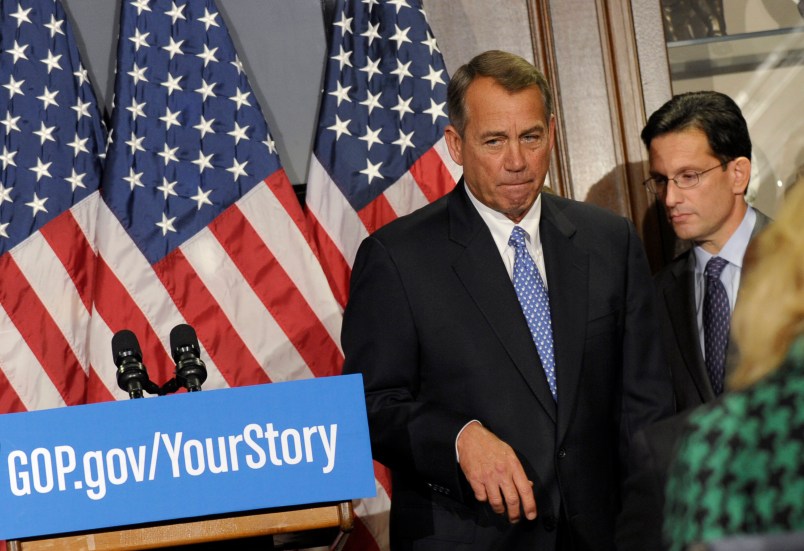House Republican leaders are gradually backing away from their promise to vote on legislation to replace Obamacare in 2014.
“House Republicans will rally around and pass an alternative to Obamacare this year,” House Majority Leader Eric Cantor (R-VA) said on Jan. 30, at the annual GOP conference retreat.
It seemed like a huge step after Republicans spent four years campaigning on “repeal and replace” without putting forward a health care alternative of their own. But one month later, GOP leaders are singing a different tune, downplaying the prospect of a vote in 2014 and insisting they’re just beginning the conversation.
“We’re going to continue to have conversations with our members about tax reform and continue that discussion. The same kind of discussion has to continue to go on with regard to replacing Obamacare,” Speaker John Boehner (R-OH) told reporters on Thursday. “And so, we’re going to continue to go through a lot of ideas. You can see our members — they’ve introduced 126 different ideas about how to fix Obamacare, how to replace Obamacare.”
Translation: We have too many ideas, and we can’t agree on which ones we want.
His unprompted comparison to tax reform was also notable, because lawmakers and aides across the board admit that it won’t happen in 2014.

Cantor, too, has softened his promise of a vote this year. The majority leader devoted a large chunk of his his Feb. 21 memo about the House GOP’s winter 2014 agenda to the health care law. But most of it was about renewing Republican efforts to undermine it and highlight its flaws. The prospect of working to replace Obamacare just got a passing mention.
“As we continue to work to finalize our Obamacare replacement plan, we will also act to highlight and address the serious consequences of the law,” Cantor wrote.
Then on Feb. 24, the majority leader described replacement as a mere possibility to the Wall Street Journal: “We may have an opportunity for an alternative to be put in place.”
In reality, the process is just about to start, and Republicans lack consensus on how to go about reforming health care. Cantor is set to meet privately on Friday with House Majority Whip Kevin McCarthy (R-CA) and House Republican Conference Chair Cathy McMorris Rodgers (R-WA) to discuss an Obamacare alternative. They’re calling it the “hope group.”

Proposing an Obamacare alternative will be a daunting task for many reasons. The unpopular aspects of Obamacare exist to finance and stabilize the parts that even Republicans are sympathetic to, most notably protecting people with preexisting conditions and letting young adults get coverage on a parent’s plan. Any alternative has to grapple with the political realities of unwinding these provisions, which have already taken effect, and make a separate set of tradeoffs, which will invariably also have some adverse consequences.
Republicans have complicated the task of putting forth a replacement bill by screaming bloody murder about disruptions caused by Obamacare, such as cancellations of insurance policies and the projected reduction in full-time labor supply as a result of de-linking health coverage and employment. Their policy space to reform health care, which was already narrow, has become narrower as a result of their political response to Obamacare taking effect.






